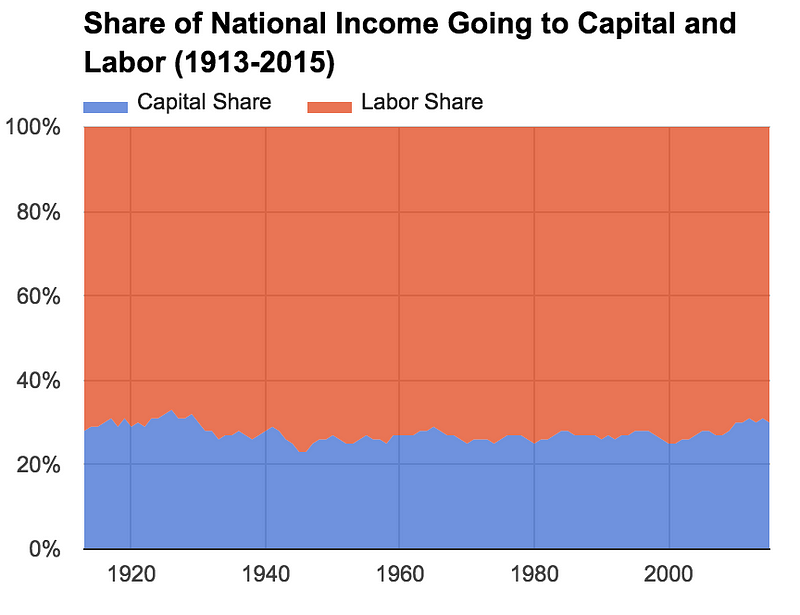The Rich Already Have a UBI
10 percent of all national income is paid out to the 1 percent as capital income. Why not give it to all as a universal basic income?

The universal basic income — a cash payment made to every individual in the country — has been critiqued recently by some commentators. Among other things, these writers dislike the fact that a UBI would deliver individuals income in a way that is divorced from working. Such an income arrangement would, it is argued, lead to meaninglessness, social dysfunction, and resentment.
One obvious problem with this analysis is that passive income — income divorced from work — already exists. It is called capital income. It flows out to various individuals in society in the form of interest, rents, and dividends. According to Piketty, Saez, and Zucman (PSZ), around 30 percent of all the income produced in the nation is paid out as capital income.

If passive income is so destructive, then you would think that centuries of dedicating one-third of national income to it would have burned society to the ground by now.
Tithing to the 1 Percent
In 2015, according to PSZ, the richest 1 percent of people in America received 20.2 percent of all the income in the nation. Ten points of that 20.2 percent came from equity income, net interest, housing rents, and the capital component of mixed income. Which is to say, 10 percent of all national income is paid out to the 1 percent as capital income. Let me reiterate: one in ten dollars of income produced in this country is paid out to the richest 1 percent without them having to work for it.
Even if you exclude the capital component of mixed income (since it is connected to work even if the income is not from labor) and housing rents (since these are imputed to homeowners rather than paid to them as cash), that still means that, from equity income and interest alone, the top 1 percent receives 7.5 percent of the national income without having to work for it. Put another way: the average person in the top 1 percent receives a UBI equal to 7.5 times the average income in the country.
If passive income is so destructive, then the income situation of the 1 percent surely is a national emergency! Where does the 1 percent get its meaning with all of that free cash flowing in?
Capital Income for All
The fact is that capitalist societies already dedicate a large portion of their economic outputs to paying out money to people who have not worked for it. The UBI does not invent passive income. It merely doles it out evenly to everyone in society, rather than in very concentrated amounts to the richest people in society.
The idea of capturing the 30 percent of national income that flows passively to capital every year and handing it out to everyone in society in equal chunks has been around since at least Oskar Lange wrote about it in the early parts of the last century. This is, to me, the best way to do a UBI, both practically and ideologically. Don’t tax labor to give money out to UBI “loafers.” Instead, snag society’s capital income, which is already paid out to people without regard to whether they work, and pay it out to everyone.
This might seem like a fantastical idea to some, but this is exactly how the Alaska Permanent Fund and the Permanent Fund Dividend works. Through the Permanent Fund, the state of Alaska owns a lot of capital assets. Those assets deliver annual capital income flows to the state, which are then parceled out in equal amounts to the citizens of Alaska through the Permanent Fund Dividend.
A national UBI would work very similarly. The US federal government would employ various strategies (mandatory share issuances, wealth taxes, counter-cyclical asset purchases, etc.) to build up a big wealth fund that owns capital assets. Those capital assets would deliver returns. And then the returns would be parceled out as a social dividend.
If you have a problem with this, but not the current arrangement where capital income is paid out in huge sums to small fractions of our society, then your issue is not really with passive income. It can’t be.